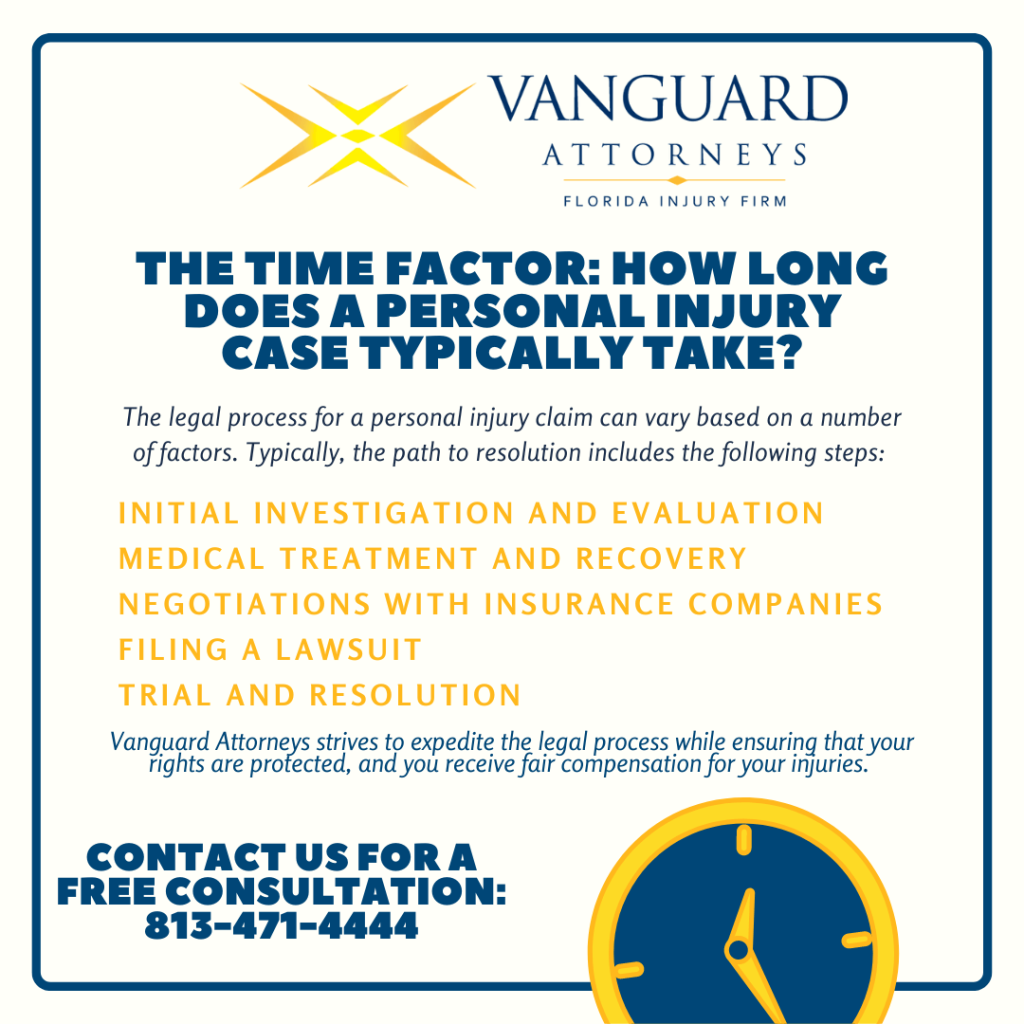How Long Does a Personal Injury Lawsuit Take?
Get a Free ConsultationTypically, a personal injury lawsuit takes 1-3 years if the case goes to trial. However, many cases are settled in less than 6 months.
In Florida, a personal injury lawsuit consists of:
- Pre-suit investigation and settlement negotiation (1-6 months)
- Discovery and pre-trial motions (6-12 months)
- Trial (1-2 weeks)
- Post-trial motions (1-3 months)
- Appeals (1-2 years)
Cases often take longer to resolve if they involve severe injuries or other complex circumstances.
Talk to a personal injury lawyer for specific details about how long your lawsuit will take. Call (813) 471-4444 for a free consultation and case evaluation.
Pre-Suit Investigation and Settlement Negotiation (1-6 Months)
The first phase is the pre-suit investigation, which takes 1-6 months on average.
The plaintiff’s attorney will meet with the client to gather information about the case and evidence from the incident including medical records, police reports, photos, and other related documents.
After determining the amount of compensatory damages the plaintiff has suffered, the attorney may send a demand letter to the at-fault party or their insurance carrier requesting compensation.
In lawsuits against insurance companies, a civil remedy notice (CRN) will need to be filed with the Florida Department of Financial Services 60 days before filing suit.
Once the defendant has been notified, settlement negotiations may begin. If the defendant/insurance company makes a settlement offer, the attorney will discuss with the client whether to accept it or proceed with a lawsuit.
If settlement negotiations fail, the plaintiff’s attorney will file a claim to the Florida Circuit Court, officially starting the lawsuit.
Discovery and Pre-Trial Motions (6-12 Months)
In the months leading up to trial, both parties will participate in the discovery process and may file pre-trial motions. The pre-trial phase usually takes 2-6 months.
Discovery gives each legal team the opportunity to obtain information and evidence from opposing counsel.
Pre-trial motions are commonly filed by lawyers from both sides to make various requests to the court. Pre-trial motions include motions to exclude evidence, dismiss the case, or change the venue.
Settlement negotiations often continue during this phase since information revealed during discovery may make either party willing to agree to a different amount of compensation than they had previously offered.
The judge will hold pre-trial conferences to set timelines and confirm that each party is ready for trial.
Trial (1-2 Weeks)
Most Florida personal injury trials occur 1 to 2 years after initially filing the claim. The trial itself can range from 3 days to 2 weeks. Complex trials with a lot of witness testimony can last a few weeks.
At the end of the trial, if the jury returns with a unanimous verdict, the judge will enter a judgment stating the result of the trial and the compensation each party is entitled to, if any.
Post-Trial Motions (1-3 Months)
The deadline for post-trial motions is 10 days after entry of the final judgment in Florida. Rulings occur within 60 days.
For example, the losing party may file a motion for a new trial or amended judgment.
In some cases, the winning party may file a motion for attorneys’ fees, requesting that the losing party pay their legal costs.
Post-trial motions are common after personal injury trials as parties dispute the propriety of verdicts, awards, and fees.
Appeals (1-2 Years)
Appeals can significantly prolong the litigation process. The losing party has 30 days from the date of a final judgment to file an appeal with the court if they wish to challenge the decision.
After an appeal is filed, the appellant has 40 days to file and serve a principal brief outlining the issues in dispute and the arguments in support of their appeal.
The appellee then has 30 days to file and serve a response brief. Then the appellant has 14 days to file and serve reply briefs.
Generally, it takes two to three months from the filing of the last brief or response to get on the court’s calendar for oral arguments.
The higher court will review the decision made by the lower court and either affirm or reverse the trial court’s decision.
How long the higher court takes to render a decision varies depending on the facts of the case.
If the losing party’s appeal is successful, the other party can then file a cross-appeal for a final review of the case.
Conclusion
From start to finish, personal injury lawsuits take 1-3 years depending on the complexity of the case and whether it goes to trial and appeal.
If you or a loved one were injured, call (813) 471-4444 for a free consultation with a personal injury lawyer. Our team will evaluate your case to determine how long your lawsuit is likely to take.

